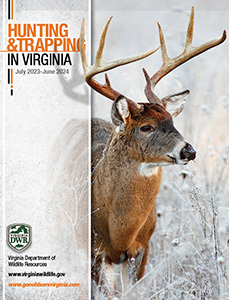General Hunting Information
Hunting Hours
(See Sunset/Sunrise Table)
- One half-hour before sunrise to one-half hour after sunset for nonmigratory birds and game animals except during spring turkey season.
- One half-hour before sunrise until 12 noon during spring turkey season, except the last 20 days when the hunting hours are one half-hour before sunrise until sunset.
- One half-hour before sunrise to sunset for Youth/Apprentice Spring Turkey Hunting Weekend.
- Hours for bear hound training season are from 4:00 a.m. to 10:00 p.m. daily.
- Bobcats, foxes, raccoons, and opossums may be hunted by day or night during authorized seasons.
- Nuisance species may be taken day or night.
Sunday Hunting
Hunting is allowed on Sundays except under the following circumstances:
- within 200 yards of a house of worship or any accessory structure thereof.
- to hunt or kill any deer or bear with a gun, firearm, or other weapon with the aid or assistance of dogs.
Note: The General Assembly passed a law in 2022 allowing Sunday hunting on public land for all game species. Many public landowners are taking advantage of this new hunting opportunity and opening their public lands for hunting on Sundays. For details on how public landowners will implement Sunday hunting on their lands please contact the public landowner or visit virginiawildlife.gov/SundayHunting.
Blaze Color Requirements
When hunting any species during a firearms deer season and on youth/apprentice deer hunting weekend:
- Every hunter (see exceptions below), or persons accompanying a hunter, shall wear a solid blaze colored (blaze orange or blaze pink) hat or solid blaze colored upper body clothing that is visible from 360 degrees or display at least 100 square inches of solid blaze colored material at shoulder level within body reach and visible from 360 degrees.
- Hats may have a bill or brim color or design other than solid blaze color. Hats shall not be in “camo” style, since the latter is designed to prevent visibility. A logo, which does not detract from visibility, may be worn on a blaze colored hat.
- Hunters using an enclosed ground blind (pop-up, chair, box, etc.) that conceals them from view shall display at least 100 square inches of solid blaze colored material, visible from 360 degrees attached to or immediately above the blind. This blaze color is in addition to any worn on the hunter’s person.
During the muzzleloader seasons for hunting deer with a muzzleloading firearm, every muzzleloader deer hunter and every person accompanying a muzzleloader deer hunter shall wear solid blaze colors as specified above except when they are physically located in a tree stand or other stationary hunting location.
Exceptions
- Blaze colored clothing is not required of waterfowl hunters, dove hunters, individuals participating in hunting dog field trials, and fox hunters on horseback without firearms.
- Hunters hunting with archery tackle during an open firearms deer season in areas where the discharge of firearms is prohibited by state law or local ordinance are exempt from the blaze color requirement.
- Other than muzzleloader deer hunters, blaze colored clothing is not required of any hunters hunting during the muzzleloader deer seasons.

